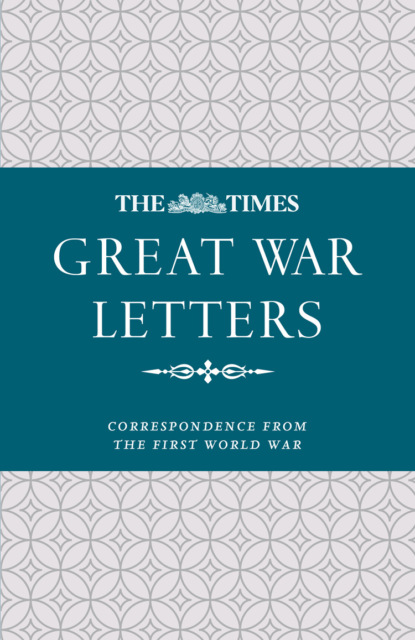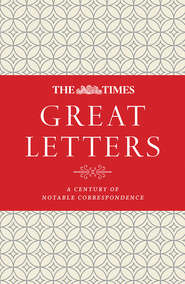По всем вопросам обращайтесь на: info@litportal.ru
(©) 2003-2024.
✖
The Times Great War Letters: Correspondence during the First World War
Автор
Год написания книги
2019
Настройки чтения
Размер шрифта
Высота строк
Поля
This is in fact an appeal to every able-bodied woman, not bound by family ties, to enlist in industrial war service. That women have forestalled this appeal is shown by the fact that one society alone, the Women’s Emergency Corps, received 10,000 offers of personal service during the first two weeks of the war. Women doctors, interpreters, chauffeurs, motorcyclists, gardeners, omnibus conductors, omnibus and taxi-cab drivers, lift women, &c., were ready to qualify for men’s posts during the war, so as to release men for military service. That this service has not been largely utilized up to the present is attributed to the attitude of men workers, and not to the lack of response among women.
Lord Kitchener recently said, “I feel strongly that the men working long hours in the shops by day and by night, week in and week out, are doing their duty for their King and country in a like manner with those who have joined the Army for active service in the field, and I am glad to be able to state that his Majesty has approved that where service in this great work of supplying the munitions of war has been thoroughly, loyally, and continuously rendered, the award of a medal will be granted on the successful termination of the war.”
To women workers engaged in war service at home, the cessation of hostilities will bring a grave dislocation of employment, and the sacrifice of their ordinary duties, for work which will necessarily only be temporary, should meet with some public recognition. It would be a cause for satisfaction among women to know that official recognition will not be denied to those women who, in the words of the Board of Trade, “by working, help to release a man, or to equip a man, for fighting.” The present emergency and the Government’s appeal to women form a propitious occasion for creating a precedent in the bestowal of honours in which other countries have already set us an example. In Russia all honours and decorations are conferred on women doing men’s work, even the war medal is conferred on women, and King Albert of Belgium has recently bestowed the Order of Leopold on the women members of one of our field ambulances. In these circumstances it would amount to an invidious distinction were women rendered ineligible for the Industrial War Medal and an announcement as to the Government’s intentions would be welcomed by women in general.
Yours faithfully,
CONSUELO MARLBOROUGH
GERMANY AND ENGLAND AT WAR: AN AMERICAN COMPARISON
20 March 1915
SIR,—ON A PREVIOUS occasion you permitted me, an American and fervent supporter of the Allies, to have the honour of addressing the readers of The Times. I trust that you will now allow me to compare a few impressions received during the past few weeks in Germany and Austria with those I have since received in London.
I possess the average American’s loathing of the military government of Germany; but, none the less, I must confess to admiration for the marvellous manner in which that government, often by specious methods I have no doubt, has united the German people and its Austrian and Hungarian allies. To arrive in England and find your upper class discussing horse-racing and some of your workpeople on strike comes as a cold douche to an enthusiast for your cause like myself.
The Germans are singularly well informed as to what is happening in England. It seems to me that their newspapers are more frank about the whole war than yours, while among the upper and official class it is fairly obvious that private communications reach Germany from England with great speed, whether by letter or by word of mouth I am unable to say. The universal impression in Germany is that there is no enthusiasm for the war in England. Fellow-citizens who were here at the period of your Boer War tell me that the enthusiasm of that time was splendid and contagious. Germans are under the impression that the English are afraid of this war. That is obviously quite untrue. On the other hand, there is, unquestionably, much complacency here. It does not seem to an outside observer that your men and women are doing their utmost to bring this conflict to a successful issue. The Germans, as you are probably aware, are under the belief that the British Empire is practically at their mercy. Nevertheless, they are straining every nerve, by land, by sea, by uniting their people, by active diplomacy in neutral countries, to win decisive victory. Among the official class in Germany such optimism does not reign, though your labour troubles are without doubt reviving hopes that were extinguished by the unsuccessful march on Paris.
Is it not possible for some of your great public orators to awaken the middle class—the “commuters” as we call them—and the democracy? Within the past 48 hours I have met one man of business who told me that he “never read the war news,” and another who obviously took very little interest in the war. He admitted it was a serious matter, but believed that the Germans were on the eve of collapse from a shortage of food, copper, and cash.
It would be absolutely impossible to find people of this kind in Germany. You may laugh at their hate campaigns and cunning tricks to arouse the world’s sympathies by pretending that they are being starved by Great Britain, but you must confess that their strenuous and enthusiastic unity and the sober preparation of the nation for a long, long struggle is an example to the world. We went through something like the same thing at home in 1861. We prepared even more slowly than you, but before the end of the war, which had been expected to last three weeks, but which did not terminate until 1865, we had in the field practically the whole of our manhood down to the age of 17, aye, and even younger than that. That is the case with Germany. There lads of 15 and 16 are drilling and preparing, and, outside the horrible newly-rich class in Berlin, the German women are all engaged in immense preparations for the comfort of the troops and the reception of the vast army of wounded they are expecting.
I trust these observations from an American of purely British descent on both sides will not be taken amiss.
Yours faithfully,
D. T. C.
EXEANT SWEATERS
24 March 1915
SIR,—MAY I INVADE YOUR columns, for the last time, to say that as I now have enough sweaters on hand to fulfil all promises made, and as we are within measurable distance of warmer weather, I propose to close my work? Your readers should on no account take this as any kind of excathedra statement that no more warm clothing is needed. I only state the fact that I have enough to carry on my small venture till the warmer weather comes. There are, however, some things which are wanted throughout the year—e.g., socks, shirts, and all cheerful little things like cigarettes, packets of tobacco and sweets, writing-paper, other personalia, and small medicaments. Any of the above I am willing to continue sending weekly throughout the summer. I venture further to suggest that it is a pity for ladies to let the “knitting habit” die down. Should we not do well to begin forming laagers of warm things for the autumn and winter? It is neither difficult nor pessimistic to prophesy a revival of the need for comforts towards the close of the year. When peace is signed, Israel cannot return to his tents in an afternoon.
I render account of my sweaters:—10,443 is the number to-day, the miscellanea kindly sent to make filling for the sacks bringing the figures close up to 20,000. We are told that this supplement of sweaters, &c., has been of some sort of use and comfort to you, soldier and sailor too, while you have been training, watching, fighting, and dying for us, the long wet winter through. E superabundantia cordis os loquitur—we are honored indeed that this should have been so. I thank my helpers for much unlooked-for kindness. They send me the sweaters and pay for the dyeing. I merely win the wager and get the credit. So no more of sweaters—till the autumn.
Yours faithfully,
JOHN PENOYRE
DR. LYTTELTON AND GERMANY
AN UNNECESSARY SERMON
30 March 1915
SIR,—HAS NOT A LITTLE too much been made of the address of the Headmaster of Eton? It seems a well-meant effort to do what is not necessary—viz., to stir in Englishmen feelings of moderation as regards Germany. As a matter of fact, throughout the whole of the war, we have been remarkable for the calmness with which we have taken the actions of our enemies and for the extremely reasonable attitude of speakers and of the Press on the subjects at issue.
Dr. Lyttelton has not lived as many years in Germany as I have done, and he cannot remember Prussia at the time of the Franco-Prussian War. He seems under the impression that only in recent years has there been feeling against England on the part of Germany. I can remember July, 1870, when it was not easy for an English boy even to walk along the streets of some German towns without being hooted and having distinctly unpleasant statements hurled at one. For one or two days in that month we were popular, because an idea prevailed that we were going to join Germany; then for a day or two we were unpopular, because it was said we were going to join France. After that time we were thoroughly disliked, because we decided to remain neutral. The dislike for England dates back certainly to that period and has never been lost. Dr. Lyttelton assumes that we are to take the German view of ourselves as being correct, and that because they have a particular view we are to take up an attitude of weakness in order that we may “save 60,000,000 people from the ruin of a poisoned mind.” One thing is certain—we shall never do that by showing any weakness. Only the other day we were told that our kindly treatment of German prisoners meant that we were afraid of what would happen at the end of the war. Germany is not at the present time able to see with unprejudiced eyes anything like generosity of action. I am perfectly satisfied that the one thing we must do now is to bring Germany to her knees, and to show her that the ideals which have been hers ever since Prussia became the dominant power in Germany are unworthy and lead to disaster.
Of course, I would go further myself, and I would say this—that England, having been placed in a position in which she can, through her naval power, to a very large extent lay down the principles in international life, should now accept the responsibility, ensure for the future that her wishes shall be carried out, and secure for her great Allies and herself relief from the constant strain of knowing that there is a Power accumulating every conceivable strength in order to foist upon nations principles alien entirely to the spirit of Christ. There seems to be in some people nowadays the idea that Christianity means a weak application of what is called the principle of Christian charity, but there is a forgetfulness that Christ advised strict dealing with, and strict punishment for, national unworthiness.
Frankly, I think our duty at the present time is not so much to consider how to behave when peace comes as how we are to gain the victory which will bring peace. At any rate, one would beg public men to whom the curious twists in the German mind are not well known to refrain from rather dangerous suggestions at the present time. Dr. Lyttelton’s address was meant well, but when read in Germany will only form the text in a great many places for suggestions that we are beginning to weaken and are prepared to give Germany very good terms.
Yours faithfully,
H. R. BIRMINGHAM
TO GOLFERS
6 April 1915
SIR,—MAY I TRESPASS upon your kindness to allow me to call the attention of those who take their cars to golf to take wounded soldiers from one of the hospitals with them and give them luncheon and tea? They will be more than repaid by the gratefulness of our wounded heroes.
Yours truly,
ONE WHO HAS TRIED IT
MR. LLOYD GEORGE ON DRINK
9 April 1915
SIR,—I OBSERVE FROM a report in the papers that Mr. Keir Hardie, addressing an Independent Labour meeting at Norwich, stated that workers who were putting in 84 hours a week had been “maligned and insulted and the lying word—on the authority of Mr. Lloyd George—had gone round the world that the British working classes were a set of drunken wasters.”
I need hardly say that there is not a word of truth in this wild accusation. I have only made two references to the effect of drinking upon the output of munitions of war. Speaking at Bangor on February 28, I said:—
“Most of our workmen are putting every ounce of strength into this urgent work for their country, loyally and patriotically. But that is not true of all. There are some, I am sorry to say, who shirk their duty in this great emergency. I hear of workmen in armaments works who refuse to work a full week’s work for the nation’s need. What is the reason? They are a minority. The vast majority belong to a class we can depend upon. The others are a minority. But you must remember a small minority of workmen can throw a whole works out of gear. What is the reason? Sometimes it is one thing, sometimes it is another; but let us be perfectly candid. It is mostly the lure of the drink. They refuse to work full time, and when they return their strength and efficiency are impaired by the way in which they have spent their leisure. Drink is doing us more damage in the war than all the German submarines put together.”
I call special attention to the italicized passages. I went out of my way to make it clear that in my judgment drink only affected a minority, even a small minority, of the workmen, and that the vast majority were doing their duty loyally. So that as far as the first speech I delivered on the subject is concerned there is not a syllable to justify Mr. Keir Hardie’s reckless assertion, but quite the reverse.
Now I come to my second reference to this topic. It was on the occasion of the deputation received by me from the Shipbuilding Employers’ Federation. The shipbuilders made it clear repeatedly that their complaints were confined to a section of the men. As one of them put it:—“There are many men doing good work, probably as good work as the men in the trenches.” In my speech in reply I said that the excessive drinking took place “among a section, may be a small section, but a very important section of workmen.” Neither in one speech nor the other was any reflection cast upon the men who, according to Mr. Keir Hardie, are working 84 hours a week. On the contrary, the complaint was against the men who failed at this critical time to put in anything approaching even 53 hours a week. On both occasions the work of those who were doing their best to help their country in this time of urgent need was fully recognized not only by me but by the employers, and I made it clear that my criticism was confined entirely to a minority and may be a small minority of the workmen.
I hope that after this explanation Mr. Keir Hardie will think it right to withdraw a statement which he must know must be very mischievous in its effect at a time when we are considering the best remedy for the serious limitation in output which is, at any rate, partly attributable to excessive drinking amongst a section of the workmen. He was, I believe, a supporter of temperance legislation for Scotland. His support was not due to any conviction that his fellow-countrymen were a nation of “drunken wasters,” but to his knowledge that a minority were so completely subdued by the drink habit that nothing but strong legislative action would enable the community either to protect them or protect itself against injury done to the state by them.
The difficulties are great enough without adding to them by exciting prejudices so easily excited when there is a suspicion of an attack being made upon a whole class of workmen. No such attack was intended—no such attack was made. On the contrary, the vast majority of the workmen engaged in the production of munitions of war were specifically excluded from any suggestion of excessive drinking that was made. The trouble is, however, that the drinking habits of the minority have the effect of diminishing—and seriously diminishing—the output of war material at a time when the success of the Allies depends entirely on that material being largely increased. The evidence upon which the Government has been reluctantly forced to come to this conclusion does not depend on statements made by employers, but upon independent inquires made on behalf of the Government. The result of these investigations will soon be published.
Yours, &c.,
D. LLOYD GEORGE
As chancellor of the exchequer, Lloyd George was to bring in new licensing laws which curbed all-day drinking for the next 80 years.
“KILLED”
9 April 1915
SIR,—THERE HAVE BEEN handed in here two returned letters which more than a few weeks ago the fair friend of a soldier, an English corporal, had written, addressing them to his regiment at different places in the wish to discover his whereabouts, and in the hope that he would be alive to receive them. Outside the envelopes appears the one word, “Killed.” The intelligence is conclusive, nor is any further information vouchsafed; but if this be the regulation made of breaking the news in such cases, it is a curt and cheap one and had need to be improved upon by more consideration being shown for the feelings of the friend writing the soldier and whose letters will, of course, have been opened in the post.








